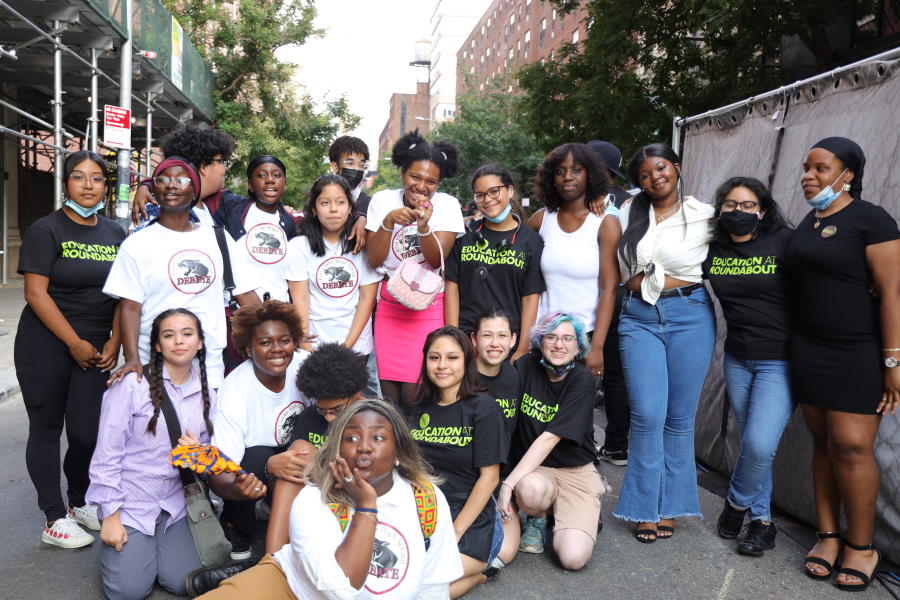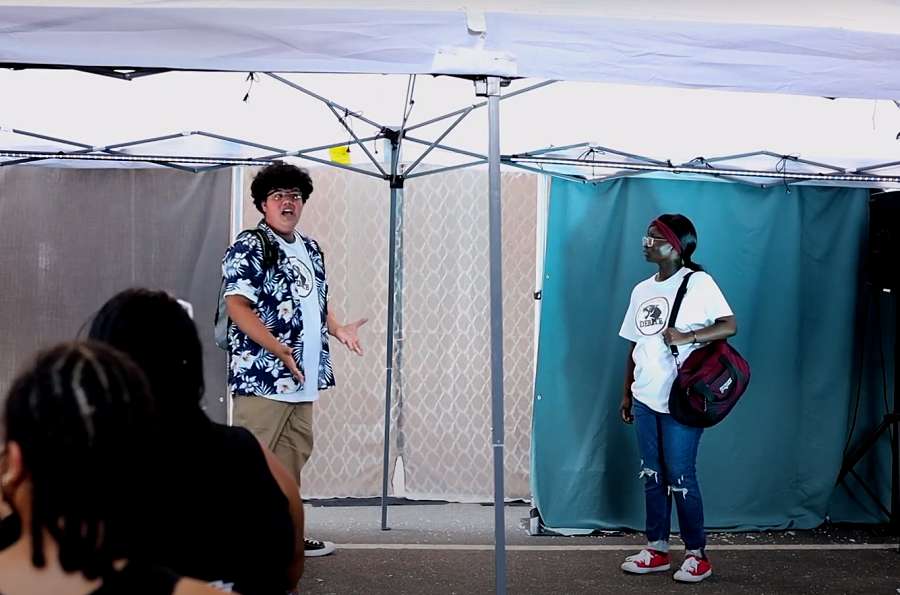Fractured, a play from the Roundabout Youth Ensemble (RYE), made its in-person last monthwafter a summer of workshopping mostly virtually. RYE, Roundabout’s youth engagement program, regularly invites New York City public high school students to envision, write, and produce an original play through a process modeled after Roundabout’s professional production methods. But because of ongoing COVID-19-related restrictions, many of the RYE’s meeting sessions took place online, resulting in a hybrid in-person/online dynamic.
The play itself continued in that double format: Originally performed Aug. 14 on a cordoned-off Hell’s Kitchen street for a friends-and-family-only audience, it was later uploaded to YouTube for all others to view. This was a marked difference from past years of RYE plays, in which students presented work at Roundabout’s Black Box Theatre to a larger in-person audience at a real, functioning theatre. (Though last year’s offering, Hidden Truths, made during the height of New York City lockdown, was a unique Zoom hybrid.)
My viewing came courtesy of that YouTube link, its dialogue moderately intelligible, in large part thanks to auto-generated video closed captioning. From what captions and program explain, Fractured follows a group of public high school students whose slot at the speech-and-debate regional semi-final is rejected at the last minute for socioeconomic reasons that were never quite made clear (or remained inaudible). This rejection spurs the characters to storm the now private-school-only tournament and deliver their thoughts on income inequality and the schooling system, Guerrilla Girls-style.
Fractured‘s premise is perfectly high-school-play-suited: The idea that those with a certain “authentic” underdog subjectivity are armed with the power to change the power structures that be is the narrative impetus behind every teen-centric piece of media of the past few decades, from Mean Girls to Heathers, even Harry Potter.
The show’s creators attempted to set Fractured within our physio-temporal place, with spartan Gen-Z signifiers as Starbucks cups and eternally clutched phones. The setting was little more than a concession stand tent, leaving the RYE team without much room to work with in terms of set or props. The spare background works just as well, as it’s a story of teenagers on the go. A further generational twist could be seen in the presentation and acting, with performers over-enunciating and emoting to the point, in a mode familiar from front-facing self-recorded camera videos.
If that touch feels particularly online, it makes sense, considering the play itself was largely conceived that way. As RYE’s education coordinator, Kimberly Aragon (she/her), explained, “It took a little longer for them to build that relationship I typically see happen quickly when it’s in person—that was one of the changes that I really saw going from in person to virtual.” While vastly different than the entirely in-person workshops of past years, the online medium didn’t seem to hinder the writers and actors. As playwright Treasure McNeil (she/her) related, “I feel like online I was able to learn from other people more, because people came in and out. We saw new faces every week.”

The dialogue of Fractured itself has a distinctly online lilt. For example, towards the latter part of the play, student Penelope helps her classmates take some Starbucks-adorned pictures before clutching the phone and declaring, “Before I get this back to you, let me make a speech, because apparently you don’t understand me. So let me have a chance to speak,” launching into a soliloquy about self, feelings, etc., in an expressive enunciation that would be perfectly suited to an Instagram story.
The play’s characterizations also remains chiefly in this vein: declaration over conversation, impression over expression. All of which is fine; this emphasis not only feels exactly like what every high schooler goes through, it seems also to illustrate the online world’s hold on the young. Fractured is a play birthed from our current web-mostly existence, with the disconnect of a Zoom screen lingering throughout.
Veronica Maldonado (she/her) is an editorial contributor to American Theatre.


